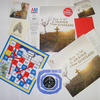Three Trapped Tigers was once just an idea in pianist Tom Rogerson’s head. It’s now a fully fledged, one of a kind, live electronica band that’s being hyped to high heaven. The reason for this? Not the usual reasons for this kind of hype, but the fact that it genuinely sounds like nothing else out there. Tom is at times an incredibly cerebral person, and at others totally governed by emotion, and this is something that is reflected in his music, with a strong extra helping of guts. As he says in this interview, Three Trapped Tigers is not a confessional band, but to watch them live almost feels like it is. Emotionally, there are no holds barred when they perform.
Arriving from a classical background, which still informs his work, and a jazz background, his conscious rejection of which also informs his work, Rogerson’s first foray into pop was listening to Aphex Twin and other Warp records artists, and Three Trapped Tigers was formed from a desire to emulate these artists in an entirely live format. Their ethos means that every sound you hear is being played by an instrument, and you will never hear a backing track at one of their shows. The EP, while possessing an impressive and thick array of sounds, is recorded almost entirely live and without overdubs. The band make a great deal of use out of drum pads, pedals and keyboards, and there is literally no computer sequencing.
Watching a band evolve is a fascinating thing, and with TTT one aspect is watching as they move away from being purely instrumental. I’ve seen Tom playing the piano on his own, and he always ends up singing something over the top as if involuntarily. It’s not even clear if he knows he’s doing it, so obviously the voice is part of the primal act of making music for him. It’s also something he clearly wants. I caught up with him to find out why, talk about instrumental music in general, and discuss why Bruce Springsteen means just as much to him as Aphex Twin.

Emmy: Do you consider yourself an instrumental band?
Yes and no. At the moment we’re being described in the press as instrumental rock, and I don’t blame anyone for it. We are trying to do electronic music live, that still has rock elements to it, and at the moment it is mainly instrumental. I’m always trying to get more vocals into it though, because I think therein lies the Holy Grail to making this kind of music more accessible.
Why is it important to be accessible?
I think it’s just selfish. I don’t want to play to small crowds anymore. I did jazz stuff for a long time before which is traditionally inaccessible and has a small fanbase and I got pissed off with it. I felt like I could do something different, and that’s what this band has come out of. For example, a lot of jazzers don’t place a great deal of importance on melody, but I feel like it’s something we can do.
You’re often compared to bands like Battles and Holy Fuck, but those bands are very accessible while being almost entirely instrumental?
You’re right, but they are much more dance rock. Our music has got bits of everything in it, I wouldn’t necessarily class it as dance music. I’m much more interested in writing something that takes you through from beginning to end. The albums that I like, like DJ Shadow Endtroducing or whatever, are start to finish records. You can listen to [Endtroducing] for 60 minutes and it’s like a Beethoven symphony. he’s guiding you through it and you never stop to think, I want to dance to this.
You might think that.
Yes, you might, but it’s much more mental emotional than physical emotional. I want people to be moved by our music, and if that means physically then great, but personally I’m not a dancer.
When you write a piece of music do you think about it as a movement? When you wrote your EP, or when you eventually do your record, will you think about it that way?
Definitely. That’s one of the reasons I’m very keen not to do a record yet. I know people download music now but I never do. I buy CDs. and because of the classical background I really like that you can pull a listener through the tracks. I think things like segue ways are incredibly important, and the tracklisting, and the sequencing.
So as a child when you were getting into music, was it more classical that you were into?
I was into U2 briefly because my brother was into them, but no, I didn’t really own anything but classical music on tape. I was in a choir at school, then I had a music teacher who really fostered me and introduced me to Britten. I was writing classical music from the age of eleven and improvising on the piano before that.
And when you listen to great music now, do you need to hear classical elements in it?
No, that’s one thing I’m happy about. I’ve learned how to judge music otherwise. For a long time, I was really snobbish. It was only towards the end of my time at University that I started listening to Aphex Twin.
But Aphex Twin is kind of the acceptable face of modern music for someone who’s been brought up classical.
Exactly. At that point I was allowing myself to like it because it was difficult, intellectual music, and it’s only slowly but surely that I’ve loosened up. When I was 22 I got really into Nine Inch Nails, and in the last year it’s been all about Bruce Springsteen and Neil Young, and they are not intellectual musicians at all.
Why do you think that is, is that a purely emotional reaction?
I love the sucker punch of emotional music. For example when I play piano on my own I can play C major chords again and again, and I don’t care if somebody says to me that they find it boring. Growing up, I loved soundtracks, and it’s always found its way into the music that I make, be it playing with someone else of in TTT. Specifically about those two artists, Neil Young and Bruce Springsteen, it’s because I lived in America for a year and I really buy into that American myth. I always love placing music within its social and cultural background and I think you can construct really sentimental narratives that enhances the experience of listening to it. Which is not to say that Bruce Springsteen is not just plain amazing music.
When you talk about people like Aphex Twin and Squarepusher, do you still feel the suckerpunch of emotion?
Certainly with Aphex Twin. I can listen to Aphex and find it incredibly beautiful. I was listening to it last night while we were driving through the snow and it was so appropriate as it’s such pastoral music, especially since I was driving through the West Country which is where he’s from. If you read any interview with him it’s all about nostalgia and childhood, and while I think his music speaks for our time more than anything else, it’s still got these faded memories in it. this nostalgia for the past that we can’t get back.
Incidentally, I also place Aphex and Squarepusher within their cultural milieu. For example, I know Aphex is from Cornwall, and I can always hear Cornwall in his music, whether or not he would say that himself. With Squarepusher, it’s an Essex thing. He’s from Chelmsford, where there’s still a huge rave and drum and bass scene, and every time I listen to his music, I hear it.
Going back to the instrumental element, why are you so keen on having vocals when a band like Squarepusher can still deliver emotion without them?
When I play the piano, I often sing to it, so it seems a waste not to do that. And considering the band is already stretched as we are, having only six limbs between us, we’re already at the limit of what we can do sound-wise. We won’t ever use a backing track, so the voice would be a big help to add a different texture, and also humanise the music. after all this kind of music is about the dialiectic between human and machine, which is the old Kraftwerk thing from years ago, and if you have the voice there it’s more of an expression of human emotion. In the past I was going for more of a Thom Yorke thing, which is "look, humanity is trapped inside a machine," but actually it’s more fun for us to say "yes, we’re playing these machines and sometimes they break or whatever, but maybe the most primal thing about this music is that there’s a voice shrieking over the top."
Your music does have a primal element to it, despite all the machinery.
It’s unusual I suppose. I don’t think about it when I write the music, but I know that these things interest me in art, and so when I present my band I hope these things come out, even if I can’t set out to do it.
And when you add more vocal elements, will lyrics be important?
Well, I’m happy with wailing at the moment, but down the line, I can’t see how we could get a lot of mileage out of me just making sounds unless the voice becomes an instrument. There are people like Meredith Monk who train the voice to become instruments, and I’d be intrigued to do that but I don’t’ think I’m technically good enough. There’s also the Kraftwerk way of lyrics being found. Our music is not confessional or personal, it doesn’t have to be associated with me personally.
Having said that, I think that writing lyrics is just as much of a craft as learning to play an instrument. Just because we all speak all the time doesn’t mean language is easy to mould. You have to bust a gut and start shit, just like you would start shit on any other instrument.
There’s also a Sigur Ros way of making up an entirely new language according to sounds.
With that there’s the danger of always using the same sounds. I feel like I should have the courage to say what it is I want to say.
Talking about the artists that you’re compared the most to, like Battles, Holy Fuck and Foals, do you feel like, coming a little after them, you’re in a good position to see what they do, find what you don’t like and refine it?
This band is a conscious reaction to a whole load of things, yes. I remember seeing Foals a few times before we began and hearing what they were doing, which is basically Berlin techno within an indie, dance rock format, and being inspired by the fact that they were doing it well and efficiently. I thought maybe I could do a similar thing with the electronic music that I love, which is the British Warp Records scene from the 90s. Definitely I had that concept in mind that I was trying to emulate what someone else was doing. I do also think that Battles have completely blown things open for this kind of music, they’re incredibly popular within their genre, and we also shouldn’t forget bands like 65daysofstatic.
And Sigur Ros?
Yes, I think we have a lot more in common with Sigur Ros than my friends or the people I talk to suggest. Ultimately, I am a pianist, that’s my bread and butter, and that’s not something that I see in Battles, Holy Fuck or whatever. It’s what I do when I sit down at home, and I don’t want to forget that at the centre of this band, is a piano.
Listen to them at http://www.myspace.com/threetrappedtigers






















